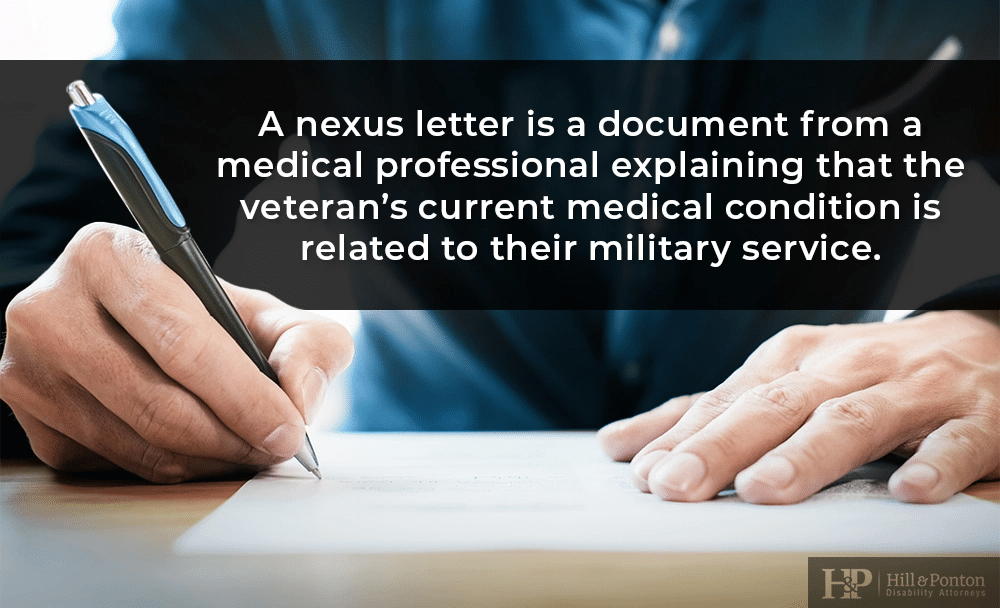Nexus (n.) a connection or series of connections linking two or more things.
The nexus, or a link between a veteran’s current disability and an in-service event, is often the hardest element of service connection to prove for a VA disability claim. However, without a nexus, a veteran’s claim with the Department of Veteran Affairs (VA) will not survive.
How does a veteran prove this complicated, yet critical part of the claims process?
The Nexus Letter.
A well-written nexus letter may be the single most important document that a veteran can have for evidence in support of their claim for VA disability benefits.
Are you short on time? Download our nexus letter template below.

What is a Nexus Letter?

A nexus letter is a document that a doctor or other medical professional prepares for a veteran. It explains the veterans current medical condition and how it is related to their military service.
A veteran is not required to submit a nexus letter in connection with their disability claim, however it can sometimes make the difference between an award and a denial on a VA disability claim. There also is no specific requirement when it can be submitted.
A veteran can submit their letter with their initial application, during the development of their claim, or after an adverse C&P exam. However, the earlier you submit it, the better.
The nexus letter is especially important in cases where a veteran has not submitted medical evidence to support their claim, and a C&P examiner concludes that there is no service-connection between the veterans disability and military service.
If done correctly, a doctor’s opinion can be instrumental for a fully-developed VA claim.
Why is a Nexus So Important?
There are three requirements for service connection that a Veteran must fulfill:
- A current diagnosed disability.
- An in-service event, injury, or illness.
- A medical nexus linking the disability with the in-service event.
As you can see, the Nexus is the third requirement for service-connection. Without it, the VA can deny service connection. They must be able to identify this link.
What Should a Nexus Letter Include?

Doctors’ opinions, especially in the form of a nexus letter, can be very valuable. Make sure to communicate with the individual writing your letter about all the details the letter should include.
The importance of a good Nexus letter is not something to be ignored. It can determine whether or not you receive VA disability benefits.
What are the FOUR Most Important Factors to a Convincing and Winning Nexus Letter?
- Use specific language (including phrases, tying facts together, and terminology)
- VA terminology is utilized and understood
- Mention that the doctor has reviewed the veterans entire file
- Utilize a doctor that has already treated you or is currently treating you.
Tips for a Doctor to Write an Effective Nexus Letter
- Identify the veteran and the purpose of your letter of support.
- Identify yourself, including your credentials and experience. Be sure to note if you are affiliated with the VA.
- Explain your clinical relationship with the veteran.
- State the veterans diagnosis.
- If the veteran has a score that fluctuates, explain the reasons.
- Describe the veterans current symptoms in detail, being thorough.
- Explain how the symptoms are consistent with the diagnosis.
- Describe the effect that the veteran’s symptoms have on day-to-day living.
- If the veteran’s disability is NOT currently service-connected, explain the link or “nexus” between the symptoms and the in-service event or exposure.
- Note where you acquired the information you used to make your decision.
When closing the letter, try restating your opinion clearly, and don’t forget to sign the letter and include all credentials to avoid confusion
Use the Proper Formatting
There are a few formatting elements that your nexus letter should have. You’ll want to make sure that the doctor writing your letter uses the proper headers. They should put their name with credentials and contact information at the top of the letter.
An example heading would be:
Dr. Jane Doe, MD
1234 Medical Lane
Boston, MA 02101
They should also include the following information above the first paragraph of the latter:
Date: January 1, 2021
Reference: [Veteran’s Name]
VA File #: XXXXX
Veteran SSN: XXX-XX-XXXX
Sign the letter with your name and credentials as well.
Keep in mind that the doctor who agrees to write a nexus letter is a neutral party.
As a neutral party, they are supposed to provide an honest medical opinion based on their review of the evidence presented to them.
The doctor is not required or obligated to agree with the veteran when writing their medical nexus opinion.
Nexus Letter Example for VA Benefits
Here is a sample nexus letter to show your medical provider.
January 1, 2021
Reference: John Doe
VA File #: 1234567
Veteran’s SSN: 123-45-6789
To Whom It May Concern,
I am Dr. Mary Medicine. I am board certified to practice in my specialty of orthopedic surgery. My CV is attached.
I am writing a statement in support of John Doe’s application for disability benefits. John Doe has been a patient at my practice since March 15, 2003. He has a diagnosis of degenerative disc disease.
I have personally reviewed John Doe’s medical history. I have also reviewed the in-service events and incidents, which include the lifting and carrying of heavy military equipment that occurred between June of 2001 and January of 2002 in Iraq.
I have examined John Doe often and am familiar with his diagnostic results, including spinal x-rays, CT scans, and MRI tests. I have attached these medical reports.
John Doe does not have a known history of risk factors that may have caused the degenerative disc disease.
Based on my professional experience as an orthopedic surgeon and knowledge of medical literature, it is known that lifting and carrying heavy objects for a prolonged period of time can put pressure on the spine and lead to degenerative disc disease.
It is my professional opinion that it is more likely than not that John Doe’s degenerative disc disease is a direct result of the prolonged lifting and carrying of heavy equipment that occurred during military service.
Signed,
Dr. Mary Medicine, MD
Orthopedic Surgery
(123) 456-7890
123 Medical Office Dr.
Anytown, FL 12345
If you need additional help with your nexus letter, please don’t forget to utilize our guide below.

Have Questions About Appealing Your Claim or Understanding How the Claims Process Works?
The attorneys at Hill & Ponton are here to support you with appealing a claim.
If you are intending to appeal a denied claim, you can contact us for an evaluation and we can help you with this process.
However, if you are considering filing an initial claim, or even if you are interested in learning about the appeals process, we offer a free ebook to get you started on the right foot!
The Road to VA Compensation Benefits will help break down the claims process from start to finish. Click the link below to learn more.



